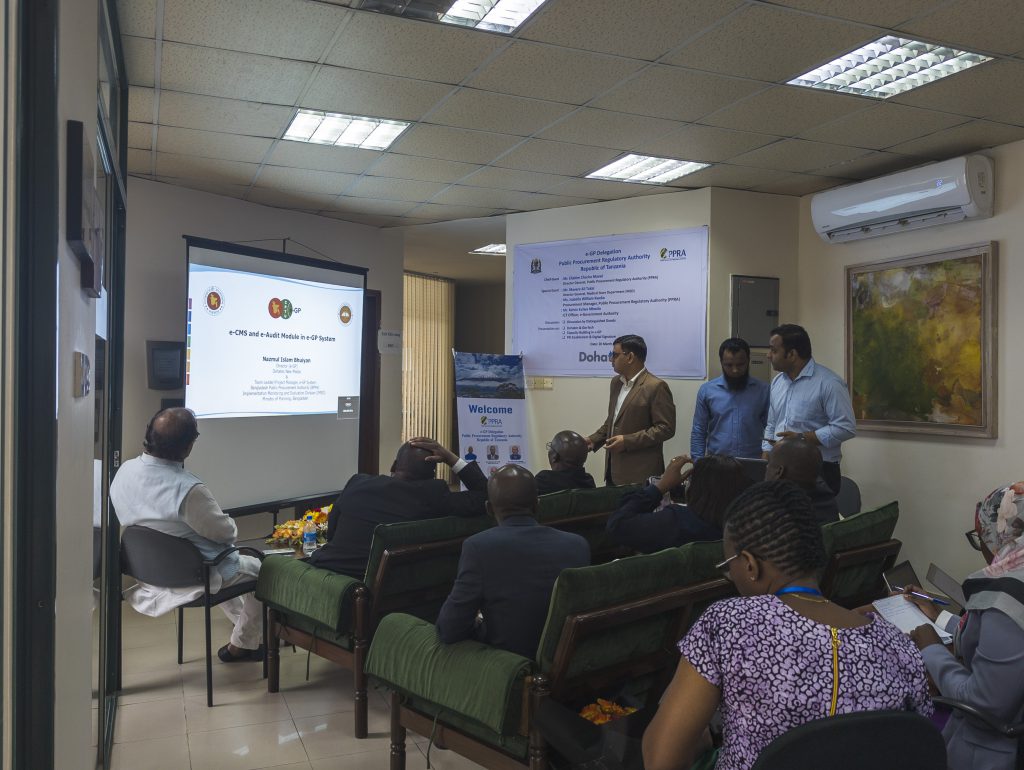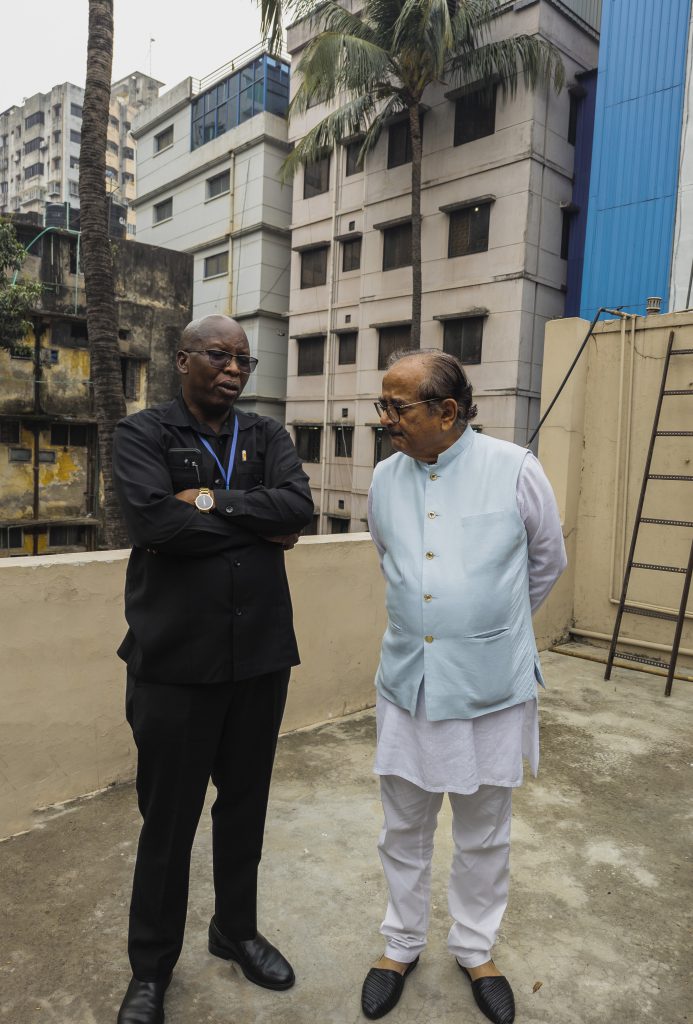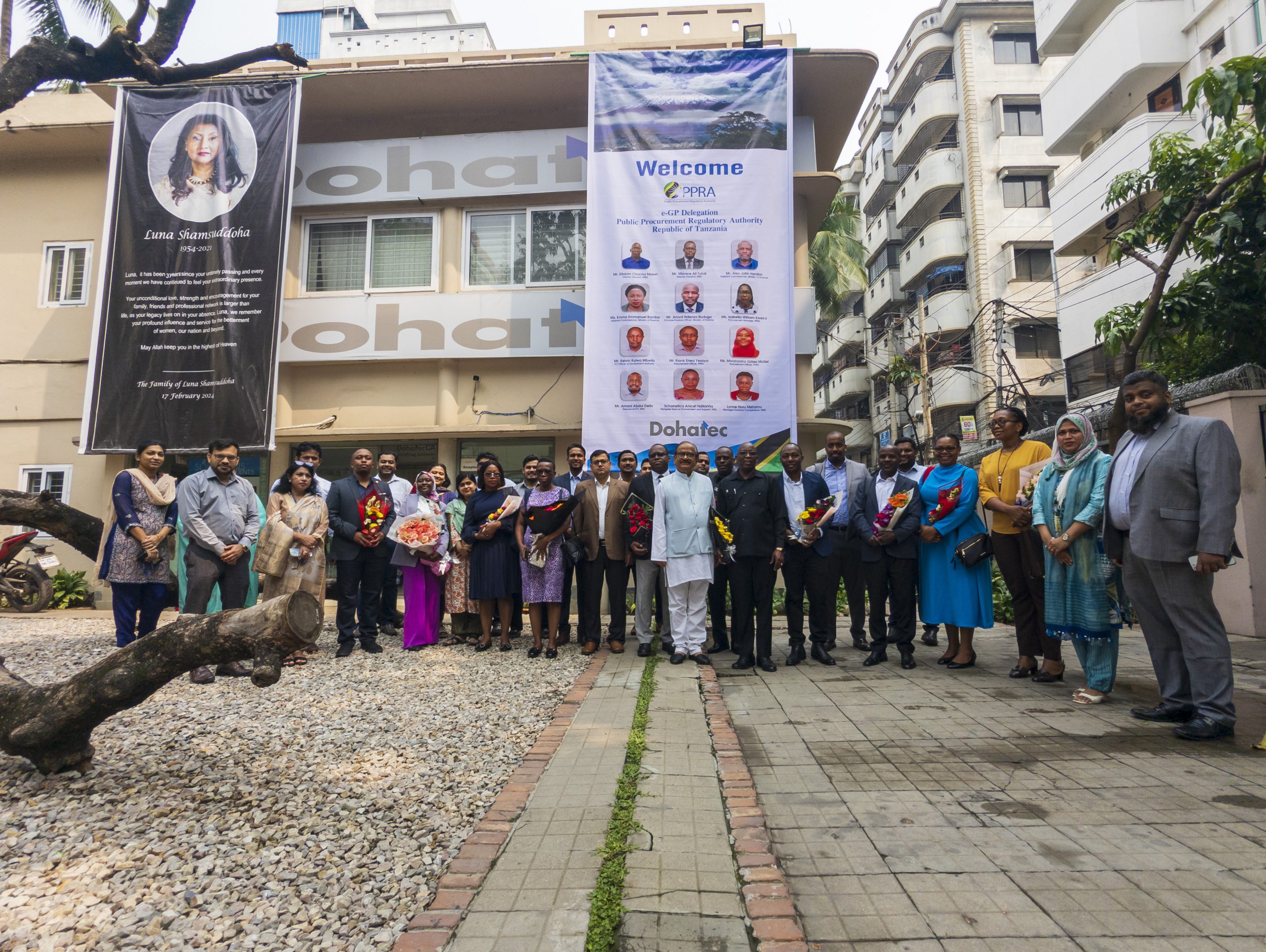A delegation from the Public Procurement Regulatory Authority (PPRA) in Tanzania recently visited Bangladesh to gain insights into the successful implementation of Bangladesh’s e-Government Procurement (e-GP) system. The primary objective of the delegation was to gain a thorough understanding of the e-GP system implementation, the challenges faced during the process, and the effective strategies employed to overcome them. The knowledge exchange program is expected to be critical in helping Tanzania improve its e-GP system by utilizing the valuable insights and best practices learned from Bangladesh’s successful implementation. The visit is also expected to strengthen the relationship between the two nations and enhance collaboration between public procurement and e-government development. Additionally, the team visited Dohatec HQ in Paltan as Dohatec New Media is closely involved with developing and maintaining the e-GP system in Bangladesh.
Knowledge Exchange Ignites e-GP Efficiency: Tanzania Learns from Bangladesh
The delegation from Tanzania’s visit to Bangladesh is about more than just observing the e-GP system. It represents a strategic knowledge-sharing initiative with several important objectives.
The Tanzanian team aims to learn about the secrets of Bangladesh’s successful e-GP implementation. This includes understanding the system’s architecture, the legal framework that governs it, and the training programs that Bangladesh uses to ensure user adoption. Tanzania can avoid pitfalls and replicate best practices in their e-GP system development by learning from Bangladesh’s experience.
In addition, the visit will foster collaboration between the two nations in the area of e-GP. Discussions may explore potential partnerships for knowledge transfer, technical assistance, or even the joint development of future e-GP functionalities. This collaboration could benefit both countries by accelerating Tanzania’s e-GP development and potentially opening doors for Bangladeshi e-GP technology companies to contribute their expertise to the Tanzanian market.
Ultimately, this knowledge exchange initiative represents a commitment by both Tanzania and Bangladesh to modernize and improve public procurement practices. By sharing experiences and exploring collaborative opportunities, both nations can move towards a more efficient, transparent, and accountable system for government procurement.
The Tanzanian delegation visited the Bangladesh Public Procurement Authority (BPPA) and saw the transformative impact of the e-GP system on transparency and efficiency in public procurement processes. The BPPA officials showcased the e-GP system’s online platform, demonstrating how it streamlines tendering procedures and eliminates the potential for manipulation associated with paper-based systems. The delegation learned about the reduction in tender processing times, the decrease in administrative burdens, and the potential increase in competition for government contracts. The visit will help shape Tanzania’s own e-GP system and solidify their commitment to implementing a similar system while tackling potential challenges.

Tech Tour Triumph: Tanzania Explores Dohatec’s e-GP Solutions
During their visit to Bangladesh, the Tanzanian delegation didn’t just visit government institutions; they also went to Dohatec New Media, a company known for technological expertise in GovTech and cybersecurity solutions. The visit became an opportunity for knowledge exchange, focusing on innovative solutions that could benefit Tanzania’s public procurement landscape.
Dohatec, with a proven track record in e-GP system development, welcomed the delegation with open arms—the day contained several active presentations showcasing how e-GP systems are built and implemented. The day’s highlight was a presentation from e-GP Bhutan, a project where Dohatec played a critical role. This offered the Tanzanian team a real-world example of successful e-GP development and implementation other than Bangladesh. In addition to the Bhutan case study, Dohatec employees provided informative presentations on the technical intricacies of the e-GP system. The Tanzanian delegation actively participated, asking pointed questions and enriching themselves with the knowledge Dohatec employees generously offered. They also showcased their own e-GP system, showing how they conduct their government procurement services.
The visit wasn’t all work and no play. Dohatec treated the delegation to a delicious lunch at their Paltan HQ, fostering a warm and collaborative atmosphere. This knowledge exchange and hospitality signifies a potential bridge between Bangladesh and Tanzania. Technology transfer agreements or joint development initiatives could be explored to leverage Dohatec’s expertise in tailoring an e-GP system to Tanzania’s specific needs. Tanzania can leapfrog some development hurdles and establish a cutting-edge e-GP system for their public procurement landscape by learning from Dohatec’s innovations and successful implementation experience.

Conclusion
The Tanzanian delegation’s Bangladesh visit wasn’t just about observing—it was a springboard for innovation. Their experience at the BPPA and Dohatec New Media ignited a fire of possibility, showcasing the transformative power of e-GP systems. Witnessing Bangladesh’s success and Dohatec’s technical prowess has undoubtedly equipped Tanzania with a roadmap for tackling inefficiencies in its own public procurement processes.
This knowledge exchange isn’t a one-way street. Bangladesh, a leader in e-GP implementation, can leverage this visit to forge new partnerships. Technology transfer or joint development with Dohatec could position Bangladesh as a top global e-GP solution provider.
Ultimately, the Tanzania visit signifies a win-win for both nations. Tanzania gains the tools and knowledge to build a robust e-GP system, leading to a more transparent and efficient public sector. Bangladesh strengthens its position as a leader in e-GP solutions, potentially opening doors to new markets and collaborations. This international exchange paves the way for a future where e-GP becomes the global standard, fostering good governance and a level playing field for public procurement.
